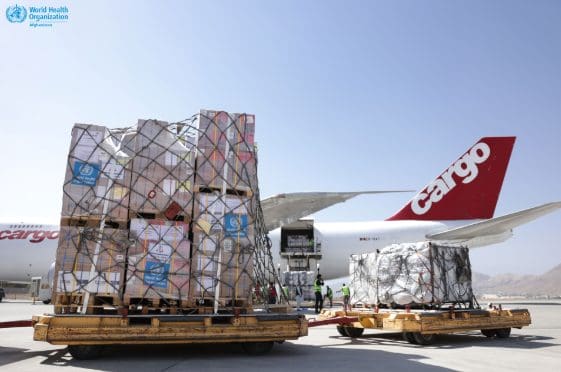The World Health Organization airlifted more than 35 metric tonnes of emergency medical supplies to Kabul Sunday, reinforcing international relief efforts for survivors of the devastating magnitude 6.0 earthquake that killed over 2,200 people in eastern Afghanistan.
The latest shipment brings WHO’s total emergency health supplies delivered to Afghanistan to nearly 80 metric tonnes since the August 31 disaster struck three eastern provinces. The cargo includes trauma surgery kits, primary healthcare supplies and essential medicines destined for the hardest-hit areas.
Afghanistan’s earthquake devastated Kunar, Nangarhar and Laghman provinces, injuring 3,600 people and destroying almost 6,800 homes according to official tallies. The disaster left tens of thousands displaced while damaging 20 health facilities and overwhelming referral hospitals with trauma patients.
The medical supplies, coordinated through WHO’s Dubai logistics hub, will support mobile health teams and healthcare facilities struggling to treat survivors in remote mountain communities. Health workers are performing emergency surgeries and working to prevent disease outbreaks among displaced populations living in temporary shelters.
Dr Edwin Ceniza Salvador, WHO’s representative to Afghanistan, emphasized the critical nature of continued medical support as communities face mounting healthcare challenges weeks after the initial disaster.
WHO deployed mobile health teams and disease surveillance systems within hours of the earthquake, part of broader international humanitarian efforts to reach affected areas. The organization has also established psychosocial support services for survivors dealing with trauma and loss.
The relief operation depends on funding from donors including the Afghanistan Humanitarian Fund and European Union Humanitarian Aid. However, sustained international support remains essential as winter approaches and displaced families face deteriorating conditions.
Afghanistan’s healthcare system has struggled with capacity constraints since 2021, making international medical assistance crucial for responding to natural disasters. The earthquake represents one of the deadliest seismic events to hit the region in recent years.
Emergency responders continue conducting needs assessments in remote valleys where access remains difficult due to damaged infrastructure. The mountainous terrain and security considerations have complicated efforts to reach all affected communities.
WHO officials stress that maintaining healthcare services requires ongoing international coordination as Afghanistan faces multiple humanitarian challenges beyond the earthquake response.
Source: newsghana.com.gh











